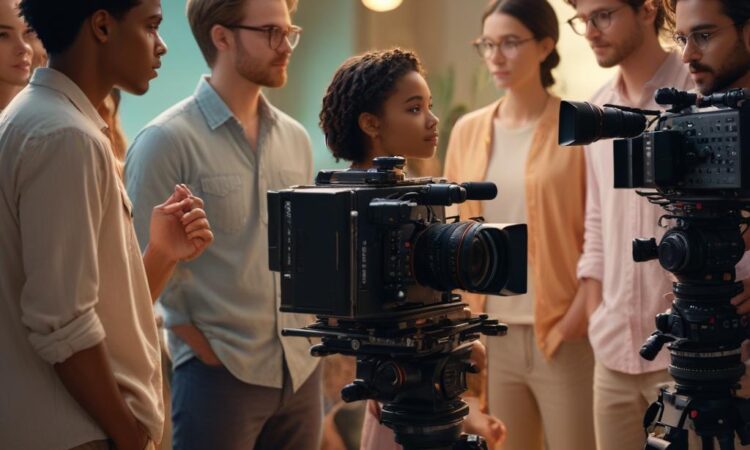The Ethics of Filmmaking: A Deep Dive into Authenticity, Representation, and Treatment
Filmmaking, a powerful medium that can captivate, inspire, and provoke, carries with it a profound responsibility to engage with ethical considerations. While the pursuit of artistic vision and commercial success is central to the industry, it’s essential to acknowledge the ethical implications that arise throughout the production process. From the initial conception of a story to the final release of a film, ethical considerations play a crucial role in shaping the impact and legacy of a cinematic work.
Authenticity: The Pursuit of Truth and the Avoidance of Misrepresentation
One of the fundamental ethical concerns in filmmaking is the pursuit of authenticity. This encompasses the portrayal of characters, cultures, historical events, and social issues. Audiences expect a degree of realism and truthfulness, and filmmakers have a responsibility to avoid perpetuating stereotypes, misrepresenting facts, or distorting narratives.
Character Portrayal and Cultural Sensitivity
When portraying characters from diverse backgrounds, filmmakers face the challenge of ensuring accurate and respectful representation. This requires careful research, consultation with cultural experts, and a willingness to challenge ingrained biases. The aim should be to create characters that are complex, nuanced, and authentic, avoiding generalizations and harmful stereotypes that perpetuate negative perceptions.
For instance, the portrayal of historical figures or events requires meticulous attention to detail and a commitment to historical accuracy. While creative license is inherent in storytelling, it should not be used to distort facts or present a misleading interpretation of the past. The historical context should be meticulously researched and presented with a sense of responsibility.
The Challenge of Representation and Avoiding Stereotypes
Representation in film is crucial for promoting diversity and inclusivity. However, simply including diverse characters is not enough. Filmmakers must actively work to break down stereotypes and challenge preconceived notions about different groups. This requires a conscious effort to depict characters with depth, complexity, and agency, allowing them to be fully realized individuals rather than simply fulfilling stereotypical roles.
For example, portraying characters of color with agency and depth, rather than relegating them to stereotypical roles, is essential for combating racism and promoting equality. The same applies to portrayals of gender identities, sexual orientations, and other marginalized groups. By showcasing the full spectrum of human experience, filmmakers can contribute to a more inclusive and equitable society.
Representation and the Power of Storytelling
Film has the power to shape perceptions and influence societal attitudes. This responsibility extends to the representation of marginalized communities and the portrayal of social issues. Filmmakers have a crucial role to play in amplifying voices that are often silenced and challenging dominant narratives that perpetuate prejudice and discrimination.
Amplifying Marginalized Voices and Challenging Dominant Narratives
The stories told in film should reflect the diversity of human experience. By giving voice to underrepresented communities and challenging existing power structures, filmmakers can create narratives that foster empathy, understanding, and social change.
For example, films that explore the struggles and triumphs of marginalized groups can raise awareness of social injustices and inspire audiences to challenge the status quo. Similarly, films that address issues of gender equality, racial discrimination, or LGBTQ+ rights can promote dialogue, understanding, and social progress.
Avoiding Tokenism and Promoting Authentic Representation
It’s essential to avoid tokenism, which is the practice of including a limited number of characters from marginalized groups simply to appear inclusive. Instead, filmmakers should strive to create narratives where diverse characters are integral to the story and contribute meaningfully to the plot.
Authentic representation requires careful consideration of the voices and perspectives of the communities being portrayed. Collaboration with members of those communities can ensure that the representation is accurate and respectful, avoiding harmful stereotypes or misrepresentations.
The Treatment of Actors and Crew: Fostering a Safe and Respectful Environment
The ethical considerations in filmmaking extend beyond the content of the film itself and encompass the treatment of actors and crew. Creating a safe, respectful, and inclusive environment on set is paramount to ensuring that everyone involved in the production process feels valued, respected, and empowered.
Respecting Boundaries and Preventing Harassment
Film sets can be demanding environments, often involving long hours and stressful conditions. It’s essential to create a workplace culture that prioritizes the well-being of all individuals. This includes respecting boundaries, promoting open communication, and establishing clear policies against harassment or discrimination.
Actors, particularly those with less experience, may be more vulnerable to exploitation. It’s vital to ensure that all actors feel comfortable and safe on set. Casting directors and producers have a responsibility to create a safe and supportive environment, fostering a culture where individuals feel empowered to speak up if they experience any inappropriate behavior.
Fair Compensation and Working Conditions
Fair compensation and reasonable working conditions are essential for the well-being of all crew members. This includes providing competitive wages, ensuring adequate rest periods, and prioritizing safety on set. Filmmakers should strive to create a workplace that is fair, equitable, and respectful of everyone’s contributions.
Exploitation of crew members, particularly those in low-paid or entry-level positions, is a persistent problem in the film industry. Filmmakers have an ethical obligation to ensure that everyone involved in the production is treated fairly and with dignity.
Conclusion: Ethical Filmmaking as a Collective Responsibility
The ethical considerations involved in filmmaking are multifaceted and require ongoing dialogue and critical reflection. It’s not just the responsibility of individual filmmakers but a collective responsibility of the entire industry to uphold ethical standards.
By prioritizing authenticity, representation, and the well-being of actors and crew, filmmakers can create work that is not only entertaining but also meaningful, responsible, and impactful. Through mindful filmmaking practices, we can ensure that film continues to be a powerful force for positive change in the world.

